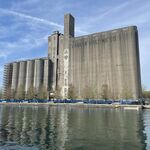This is ridiculous.
How can the City hold a referendum on where to put other people's money?
Despite everyone bitching about McGuinty not giving enough money for transit, I dare one of you to name ANY city on this entire planet where a senior level of government is going to build a new rapid transit line and not ask the local government or people of the city to contribute one plug nickel. Just one example will do.
Perhaps if Torontonians were actually putting any of their own money on the line they may demand more accountability ie $1.2 billion for 6km of LRT track which will require 4 years to lay.
A REAL referendum would be one where the city asks the locals to put their money where their industrial size mouths are.
American cities vote on referendums all the time to raise funds for their mass transit whether it be Seattle, L.A., Denver, Phoneix, or the most recent example Durham/Raleigh. Their cities are building rapid transit because their citizens have agreed to pay their fair share of. They didn't wait until the senior levels of government to pay for it all. They rightfully expect senior levels of government to pay their share as they have larger taxing powers but they know that to expect everyone to pay for someone elses infrastructure is unfair.
The people of London, Sarnia, Sudbury, and Kingston expect that they must contribute to their own infrastructure costs but somehow Toronto should be exempt. Even the idea of Toronto paying 1% of the Eglinton line is nothing short of heresy. Those other places don't have and fiscal problems of their own. Since when does London have to pay for transit, welfare, roads, sewage, water, the arts etc?................only Toronto does that. I know for a fact that Londoners don't even pay municiple taxes because they let Queen's Park pay for everything. Who ever said London was a bunch of gutless WASPs?
Newsflash............Queen's Park is broke and unless Toronto can ever gets it's head around the notion that they should also contribute to their own transit infrastructure, Eglinton will be the end of it.
Metrolinx and Toronto need to lay down the law and state that we need X amount of dollars and the only way we can do it is gas taxes and/or sales tax. Any city that OKs the referedum get's 100% of the own money with a percentage going to GO. If a city doesn't OK the deal they know ahead of time that any future transit money is now dead and their GO fares will be going up will the other city's will see theirs decline.
They could also design the question to take the guess work out of where the money should go and how it should be spent.
Question #1.......Do you support a 0.5% regional sales tax and a 5 cent increase in gas taxes for GO and local transit for the nexxt 10 years? If yes, continue to question #2...............if no, questionaire finished.
Question #2........It has already been determined that 20% of all raised funds will do towards GO expansion and operational costs. The other 80% will go 100% towards your local transit autgority {eg in Toronto funds will to the TTC}. The 26km Eglinton LRT line is already funded and underconstruction. You you prefer the funds going to the TTC A} 100% towards daily operations to improve things like frequency and hours of operation, B} 100% towards future rapid transit expansion, C} an even split between the two.
Question #3.........If you stated you would like some or all of the funds going towards rapid transit expansion already knowing thet the 26 Eglinton line is already funded, where do you think any future rapid transit expansion funds should go......A} Continue the Eglinton line up to Malbern and west to Pearson airport, B} Complete the entire Sheppard subway line Spadina subway to STC, or C} A new Downtown Relief line from Danforth & Pape to Bloor and Dundas West stations via Queen or Union stations?
Then just leave room for the comments they never read anyway.
Such a plebisite would take the guesswork out of how to get funds and where they should be spent.
Mc Guinty {nor any of the party leaders} would refuse to allow the implementation of such new revenues if it was OKed by a plebesite.




